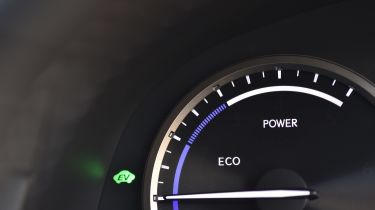Lexus NX 300h MPG & CO2 emissions
The Lexus NX 300h has limited battery-only range and can be thirstier than diesels on a long run
| Fuel economy | CO2 emissions |
|---|---|
| 37-40mpg | 161-175g/km |
The Lexus NX 300h boasts impressive MPG and CO2 figures thanks to its hybrid drivetrain, but in real-world driving the advantages are less clear-cut – whether you’re comparing with a traditional diesel SUV or a newer plug-in hybrid.
Lexus NX 300h MPG & CO2 emissions
The NX 300h only comes with one engine option: a 2.5-litre four-cylinder petrol that returns up to 40mpg in entry-level front-wheel-drive form, or slightly less with the four-wheel drive that's standard elsewhere in the range. That’s with 18-inch wheels fitted; if you specify optional larger wheels, the figures drop slightly. In real-world driving, we’ve seen closer to 30mpg, which is poor for such an economy-focused car.
Because it lacks the ability to drive very far on batteries alone, the NX 300h can’t deliver petrol-free commutes like its plug-in hybrid SUV rivals. If you drive a lot around town, the battery assistance should make it more fuel-efficient than traditional petrol and diesel rivals.
However, it’s not going to be as frugal as the latest diesel SUVs if you regularly notch up high mileage out of town. Either way, the Lexus has a 58-litre fuel tank, so you’ll be thinking of filling up every 350-400 miles.
The Lexus NX 300h has a pretty good official CO2 emissions figures of 161g/km (front-wheel drive) and 175g/km (four-wheel drive), but the Volvo XC60 D4 diesel is slightly better, at 158g/km. Performance is on a par, too, so unless you drive a lot in town, there’s little extra benefit to be had from the Lexus’ hybrid powertrain.
If you do drive in town, the XC60 D4 has a stop-start function to cut pollution when other cars are idling, but can’t compete with the NX 300h’s electric mode – you’d need the more expensive XC60 Recharge plug-in hybrid version for that.
